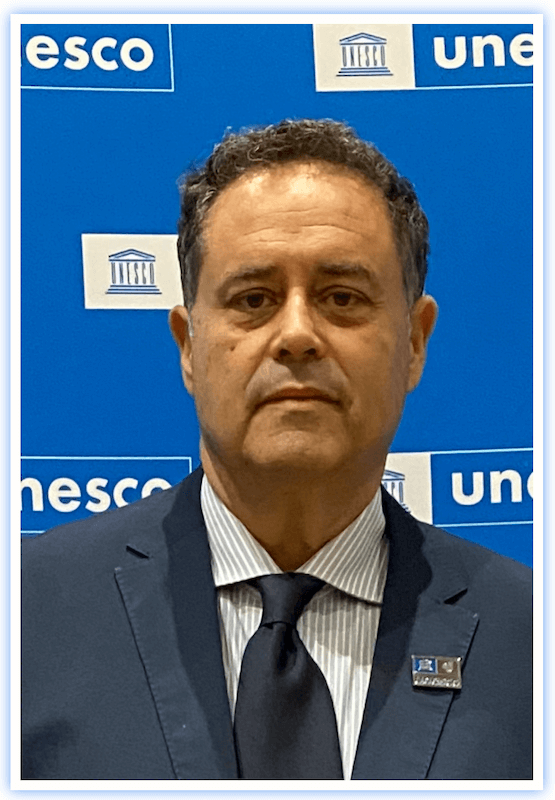Stavros Katsios
Director of the Hellenic Sinology Center at IU
Director of the Laboratory for Geo-cultural Analyses (GeoLab)
Visiting Professor at BLCU, China
| Field: | International Economic Relations and International Economic Crime |
| Rank: | Professor |
| Government Gazette: | 475Γ/21.05.2015 |
| Telephone: | +30 2661087162 |
| Email: | skatsios@ionio.gr |
| Website: | https://unesco.ionio.gr/en/ |
| Office hours: | Wednesday 12.00-13.00 upon arrangement via e-mail |

Stavros KATSIOS is Professor of International Economic Relations and International Economic Crime* at the Ionian University, Corfu, Greece and Director of the Laboratory for Geocultural Analyses (Geolab); he is Chair Holder of the UNESCO Chair on Threats to Cultural Heritage and Cultural Heritage-related Activities at the Ionian University, Director of the Institute for Language, Translation and Interpreting Studies of the IU's Research Center, Director of the Hellenic Sinology Center, Coordinator of the Yellow Tourism Research Consortium and Institutional representative at the Scholars at Risk (SAR) international Network. He has studied law at the “Albertus Magnus” University, Cologne, Germany, at Georgetown University, Washington D.C., USA (scholarship for attending courses in International Law and Policy) and at the Aristotle University, Thessaloniki, Greece. He holds a university degree in Law from the Aristotle University of Thessaloniki, Greece (1987), a postgraduate Diploma in European Law from the “Europa-Institute” of Saarland University, Germany (1991) and a Ph.D. degree in Commercial and International Economic Law from the Aristotle University of Thessaloniki (1997). He is institutional representative and member of the Supervising Body for Certified Translators at the Hellenic Ministry of Foreign Affairs.
His research is focused on the institutional dimension of the International Economic Relations and International Economic Crime (e.g. money laundering, corruption, criminal threats to cultural heritage, etc). He served (from 2011 to 2015) as elected Vice Rector for Economic Management and Development of the Ionian University. In 2004 he was appointed by the Minister of Economics as Member of the Working Group “Non Tax Revenues–Money Laundering Proceeds” at the Greek Ministry of Economy for drafting the Greek Tax Law. 2016 he was appointed by the Minister of Finance as the co-head (WG National Vulnerability) of the National Risk Assessment Experts’ (NRA) Committee for the FATF Mutual Evaluation Report of Greece in collaboration with World Bank from December 2016 to April 2019). He is a lawyer, member of the Thessaloniki Bar since 1990 and of the German Bar Association (DAV) since 1996.
Since 2002 he teaches various law and economics courses at the Ionian University (D.F.L.T.I.) and lectured on Anti-Money Laundering policies at the Hellenic Banking Institute of the Hellenic Bank Association in Athens (2010-2014). Since 2004 he is academic member of the “Association of Certified Anti-Money Laundering Specialists” (ACAMS). Since 2009 he is a frequent invited speaker at the International Symposium of Economic Crime held annually at Jesus College, Cambridge University, UK. He has been lecturing on Economic Crimes/Money Laundering, Police Academy, School of National Security (1998-2005). He is expert contributor for the Chapter Greece of the LexisNexis Platform on Global Money Laundering and Terrorist Financing and author of books and numerous scientific articles.
* Description of the Subject
Combating International Economic Crime is in rapid development as states seek to catch up with criminal practices that are facilitated by economic globalization, by the diversity and territorial limitations of national market regulations and criminal laws, and by the opportunities offered by modern forms of electronic transactions. Coordinated international efforts to fight transnational business delinquency concern, first, the harmonization of the definition of economic crimes. Such harmonization is more advanced on the regional level, in particular in the European Union, than on the international level, where it essentially covers only money laundering and corrupt practices. Similarly, as regards cooperation in enforcement matters, international cooperation, though occurring in limited areas such as drug trafficking, remains in its infancy, however promising it may be. By contrast, on the regional level, the European Union has made considerable progress as regards judicial assistance, mutual recognition, and even joint enforcement by relying, on the one hand, on the conclusion of conventions between member states and, on the other, by implementing the opportunities for cooperation offered by the third pillar of the EU Treaty. More generally, the development of international criminal law is characterized by both increased reliance on binding agreements rather than on the soft law of recommendations made by international organizations and by better monitoring of the use and effectiveness of international instruments.
Back
Staff
Secretariat
Galinos Building (1st floor)
Corfu, GR-49132
Open to the public:
Mon, Wed, Fri: 11am - 1pm
Tue, Thu: 11am - 1pm (Erasmus+)
 E-Class Platform
E-Class Platform
 eSecretariat
eSecretariat
 Webmail
Webmail
 Learning Material Management
Learning Material Management
 Internship Portal
Internship Portal
 Library
Library





 Katsios Stavros: Curriculum Vitae
Katsios Stavros: Curriculum Vitae
